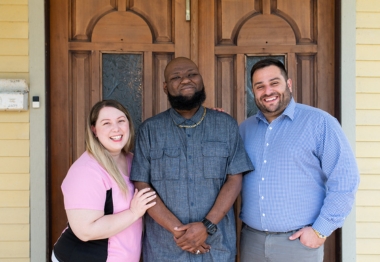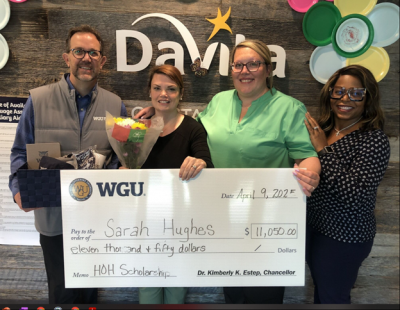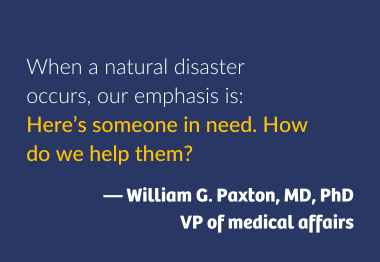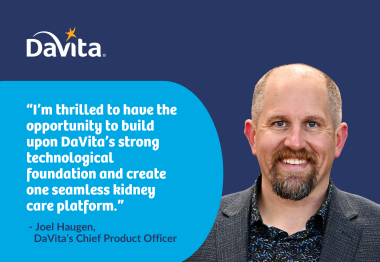Who Will Inspire the Next Generation of Nephrologists?

BY DR. MIHRAN NALJAYAN
Chief medical officer of Home Modalities and Pediatrics at DaVita
Clinical Associate Professor of Medicine, Section of Nephrology and Hypertension, LSU School of Medicine, New Orleans, LA
As the global shortfall of nephrologists[1] intensifies, many nephrologists — myself included — see a perfect storm forming: Fewer residents are choosing nephrology as a career, as a generation of nephrologists retires from practice, and global mortality rates from chronic kidney disease have increased by more than 40 percent in three decades. Shortages spread, demand for kidney care grows, and studies have shown that the result is reduced access and quality of care for patients who desperately need it.
We need more nephrologists, and we need them now.
Currently, the shortfall most severely impacts academic medical centers — with far-reaching consequences. This year, only 66 percent of nephrology fellowship positions were filled, down 10 percent from last year. Academic nephrologists are having to step in and do more clinical service time to close the gaps where there are no fellows. They make calls by themselves, work weekends by themselves, cover services by themselves. Residents and students see the nephrologist arriving in the middle of the night to put in dialysis catheters, and they develop a very narrow view of life as a nephrologist.
That’s why the most critical resources we have to address the nephrologist shortage are nephrologists themselves. Who better to give an accurate, complete picture of what we do and why we do it? Who else could? When we take time to reach out to those considering nephrology, the results can be incredible.
In 2019, the American Society of Nephrology’s annual Nephrology Fellow Survey reported that 80 percent of nephrology fellows would recommend the specialty — up from 67 percent in 2015. Nearly a third of respondents participated in ASN-sponsored programs designed to drive interest in nephrology careers.
The shortfall we are experiencing is a problem of recruitment — not retention. Students and residents who do choose to pursue a career in nephrology often fall in love with it. Just like I did, thanks to the mentorship of an incredible nephrologist.
In medical school, I had considered radiology, cardiology and endocrinology. But in my fourth year, I did a rotation with a nephrologist named Dr. Joan Blondin. Brilliant and deeply committed, Dr. Blondin graduated from LSU Medical School in 1969 and opened a nephrology practice in Monroe, Louisiana, where she provided incredible care for her patients for 22 years. When I met Dr. Blondin, she had retired from private practice and returned to LSU Medical School in Shreveport to share her knowledge and experience with students, fellows and residents.
Patients would come to the hospital with serious complexities and co-morbidities, and Dr. Blondin would know more about them than anybody else caring for them. She knew them personally; she knew their care teams; she knew their treatment; she knew their families; she even knew what insurance coverage they had. She was deeply connected to patient needs and knew the best ways to address them. I couldn’t have been more impressed — or inspired.
In nephrology, I saw everything I was looking for. I loved the specificity and acuity of kidney care, but I also loved the wide span of nephrology’s complexity. There was outpatient, inpatient, ICU and procedures; patients with chronic kidney disease, patients receiving dialysis, patients presenting with co-morbidities like diabetes and lupus. You were an important part of a team providing continuity of care for patients in deeply connected families and communities, and you formed deep personal and professional relationships. To me, it felt like an incredible opportunity to practice in the old school family medicine model while still getting to focus within a specific specialty.
But as medicine moves towards a shift-work model, nephrology can look like a tough choice when compared to careers in hospitalist medicine, emergency room medicine and critical care medicine. In those fields, doctors work seven days on and seven days off, and when they leave work, they are done for the day.
Compare that to a new nephrologist, who may start the day rounding on hospitalized patients, then see patients at their clinic, round on a shift of outpatient dialysis patients, and then round at the hospital again, all in one day. It can be emotionally challenging, difficult work, treating acutely sick patients with all-hours emergencies who need to be urgently dialyzed. Students typically emerge from school with hundreds of thousands of dollars of loan debt and see classmates graduating into seemingly less demanding fields that often pay 30 to 50 percent more as a starting salary.
What they don’t see, though, is what many of us now know — that the experience they have as a fellow is not representative of what it's like to be an attending nephrologist. As a fellow, I spent many a middle of the night in the hospital — assessing patients in an emergency, deciding if they needed to do dialysis, putting in the dialysis catheter and then waiting for the dialysis nurse to initiate a treatment. But as an attending physician, I rarely do this with support available in the hospital for dialysis catheter placement and reaching out to the dialysis nurse to perform emergent dialysis treatments. Students go to online forums or Google median salaries, see the pay discrepancy between nephrology and other subspecialties, and decide against it — never knowing the bigger picture of additional revenue streams from medical directorships, joint ventures, investment portfolios of real estate and value-based care incentives.
That’s why mentorship is so critical. When nephrologists give an accurate account of what it is like to work in nephrology, students and residents not only are more likely to choose it, they recommend it. For those students and residents — who, like us, value the deep satisfaction and emotional rewards of long-term relationships, continuity of care, and the teamwork of multi-disciplinary environments — there is really nothing like it. Nephrology, not only allows for work-life balance and financial security, it can offer greater satisfaction, purpose and happiness than practicing other types of medicine.
As the global shortfall of nephrologists looms, it is more apparent than ever how important our work is. Nephrology has given me everything I hoped for from a career in medicine. Now it is time for all of us to give back to nephrology by inspiring a new generation of nephrologists. I would encourage you to consider being a mentor through the ASN STARS program or build relationships with nearby medical schools or internal medicine residency programs to provide exposure to nephrology for those students and residents. Whether that means speaking on a panel to an interest group or having someone spend a day with you in your office, that type of experience can go a long way to inspire a future nephrologist!
[1] The 2019 Global Health Atlas reported that more than 70% of nations indicated a shortage of nephrologists.








